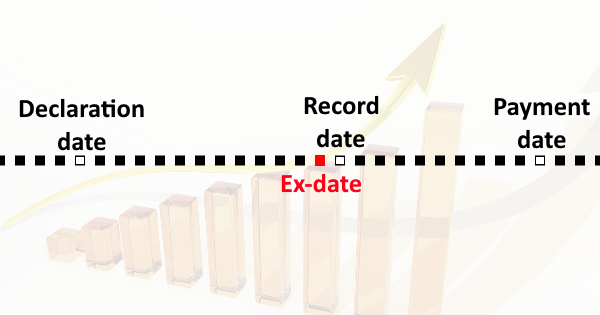
Ex-dividend date is the first day that a stock is traded without dividend for the relevant period.
As GoldBank declared in July, the dividend record date will be 16 August, which means that the ex-dividend date for GDB is 15 August 2018.
A company declares that it will pay a dividend on the declaration date, which is usually some time before the record date, at which all shareholders in the given company are determined and recorded as recipients of the dividend. Because trades typically take two days to settle, investors who want to buy the stock and receive the dividend actually need to do so before the end of the trading day a couple of days prior to the record date. Therefore, the ex-dividend date (also called the ex-date) is typically one business day before the record day. The dividend is then paid on the payment date. This means that anyone who purchases the stock on its ex-dividend date (or later) will not receive the dividend, because he or she will not be considered an owner of record as of the record date. Because a dividend contributes to the value of the stock, the share price of dividend-bearing stocks typically decreases by approximately the amount of the dividend as of the ex-dividend date. This is more noticeable in Europe, where companies typically pay dividends annually, than in the U.S., where quarterly dividends constitute the norm.
Jako „ex-dividend date“ se označuje první den, ve kterém se akcie obchoduje bez dividendy za příslušné období.
Jak společnost GoldBank vyhlásila v červenci, rozhodným dnem dividendy bude 16. srpen, což znamená, že ex-dividend date akcie GDB je 15. srpen 2018.
Společnost vyhlásí, že vyplatí dividendu v den vyhlášení, které je obvykle nějakou dobu před rozhodným dnem, ke kterému jsou stanoveni akcionáři dané společnosti a jsou zaznamenáni coby příjemci dividendy. Protože vypořádání obchodů typicky zabere dva dny, investoři, kteří chtějí koupit akcii a získat dividendu, to musí ve skutečnosti udělat před koncem obchodního dne dva dny před rozhodným dnem. Proto je ex-dividend date (také nazývané ex-datum) je typicky jeden obchodní den před rozhodným dnem. Dividenda se potom vyplácí na výplatní den. To znamená, že kdokoli, kdo si akcii koupí na její ex-dividend date (nebo později) nezíská dividendu, protože nebude pokládán za zapsaného vlastníka k rozhodnému dni. Protože dividenda přispívá k hodnotě akcie, cena akcie nesoucí dividendu typicky klesne o výši dividendy k ex-dividend date. Toto je více patrné v Evropě, kde společnosti typicky vyplácejí dividendu ročně, než v USA, kde je normou čtvrtletní dividenda.
English Editorial Services’ mission is to assist international businesses and organizations of all sizes to communicate clearly, correctly, and persuasively with their business partners and target audiences.
Simply subscribe to receive our Business Term of the Day at no charge to your inbox each business day, with explanation in English and Czech.



English Editorial Services’ mission is to assist international businesses and organizations of all sizes to communicate clearly, correctly, and persuasively with their business partners and target audiences.
Simply subscribe to receive our Business Term of the Day at no charge to your inbox each business day, with explanation in English and Czech.

